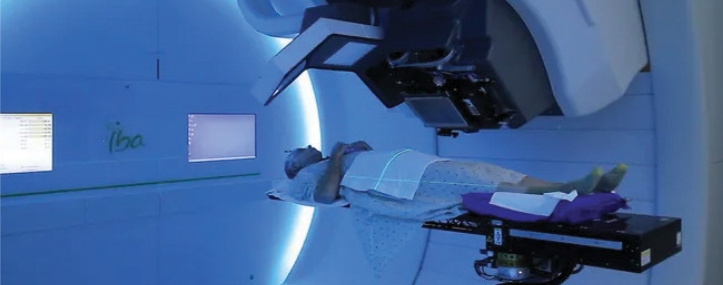
Proton Stands Out Among Options
Radiation oncologists are physicians who specialize in treating cancers and benign disorders with radiation therapy.
Doctors often refer patients to us who have been diagnosed with prostate cancer so we can review treatment options, but it’s not unusual for patients to call with a self-referral or even to request a second opinion.
Since
Willis-Knighton Cancer Center is the only location in the state with
proton therapy, we hear from patients throughout the state and from the
surrounding area. For example, a man from New Orleans called us
directly. He was sexually active and a poor candidate for prostate
surgery, so he had been researching other options and decided to contact
us about proton therapy. We explained that if he wanted to stay close
to home for his treatment, conventional radiation was a very effective
and equivalent option to surgery. However, we also shared that proton
therapy (also called particle therapy) with our Proteus One scanning
unit would be a good alternative. He subsequently came to
Shreveport for a 90-minute consultation and decided to remain here to
receive proton therapy. It was an excellent option for him, and he was
glad he made the trip.
Why
would he choose proton therapy? Protons use high-energy particles to
destroy cancer. Unlike conventional radiation therapy, which uses
X-rays, protons deliver much less radiation to the patient. That means
fewer side effects and a lower risk of complications. This reduced risk
is because protons deposit all their cancer-killing energy directly into
the cancer, not the surrounding tissue. While conventional radiation
can be very effective, it’s well-known that it will expose a larger area
of the patient’s body to the radiation beams.
Prospective trials at Massachusetts General Hospital and the University of Florida showed that proton therapy treatment resulted in lower gastrointestinal and genitourinary toxicity rates than conventional therapy.
The
reduction in radiation exposure and side effects are well known, but
studies have also demonstrated excellent long-term control of the
disease. One large study at the University of Florida showed that
five-year control rates with protons were superior when compared side by
side to prior results obtained with surgery or IMRT/conventional
radiation. A recent publication revealed that patients treated with
protons demonstrated excellent disease control with a 10-year survival
rate of 91.3%.
Prostate
cancer is the second most common cancer in men and the second leading
cause of cancer death after lung cancer in American men.
This year 34,000 men will die from the disease. Ideally,
all patients should have an evaluation with both a urologist and a
radiation oncologist. Treatment options vary and can include active
surveillance, focal ablative procedures, surgical resection, systemic
treatment with hormone therapy (and occasionally chemotherapy) or
radiation therapy delivered with multiple techniques, which include
proton therapy.
While
all of these treatment options are available at Willis-Knighton, our
innovative use of advanced technologies and conventional IMRT – and the
forward-thinking of our team, administrators and board of trustees –
allowed us to introduce proton therapy in Louisiana. Today, we are one
of only 30 locations in the United States that offer protons.
Protons
can be particularly useful in treating prostate cancer because the
gland is located near several critical structures, including the bladder
and rectum. Using protons, those structures get less exposure,
diminishing urinary and bowel dysfunction. Erectile dysfunction and
bladder leakage are notably lower. The best candidates for proton
therapy are men whose cancer is still localized to the gland or regional
lymph nodes.
However,
it can be used in more advanced cases. It is also given after surgery
in patients with recurrence who are at high risk for recurrence. Even
though proton therapy has limited availability, it is now considered a
standard option for prostate cancer. Because Medicare covers proton
therapy, it is accessible to older patients.
Many
highly regarded cancer centers, including Massachusetts General, Loma
Linda, the University of Pennsylvania, the University of Florida and MD
Anderson, were early sites, with Willis-Knighton becoming the 14th
proton facility in the country. Our program at Willis- Knighton opened
before those at prestigious centers like Memorial Sloan Kettering, Johns
Hopkins, Mayo Clinic and St. Jude’s.
We
are proud to have been at the forefront of this innovative therapy. Our
success can be attributed, in large measure, to the team we have
developed in the Willis-Knighton Cancer Center Radiation Oncology
Department. The team continues to receive national recognition. Just a
few years ago, a paper the department submitted describing the
commissioning of our Proteus One received the 2019 George Starkschall
Award for the best medical physics publication in the United States. Our
department also serves as an educational site for medical physics
residents and is an international proton training site. For instance,
the only proton center in Spain sent their team for training in
Shreveport.
Despite
this international attention, it’s interesting to hear that local
patients are often unaware that this innovative technology is available
here and that we’ve been the leading edge of proton therapy.
We are proud of the results we achieve here and the benefits we bring to patients in the Ark-La-Tex. We’re a nonprofit community
Protons can be useful in testing prostate cancer.
health
system dedicated to improving healthcare services for our community,
making this highly specialized option available to a wider range of
people. It’s why the former head of the international proton research
group PTCOG noted that Willis-Knighton Radiation Oncology has “helped
democratize proton therapy.”
Lane
R. Rosen, MD, FACRO, is director of radiation oncology for Willis-Knighton Health System. Second opinions are provided in the department
by contacting (318) 212-4639. Any patient who is a candidate for proton
therapy is referred to a Willis-Knighton urologist to assist with
preparation for treatment.